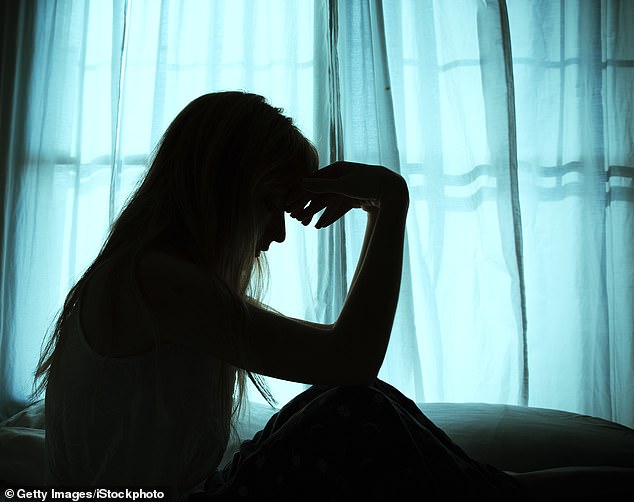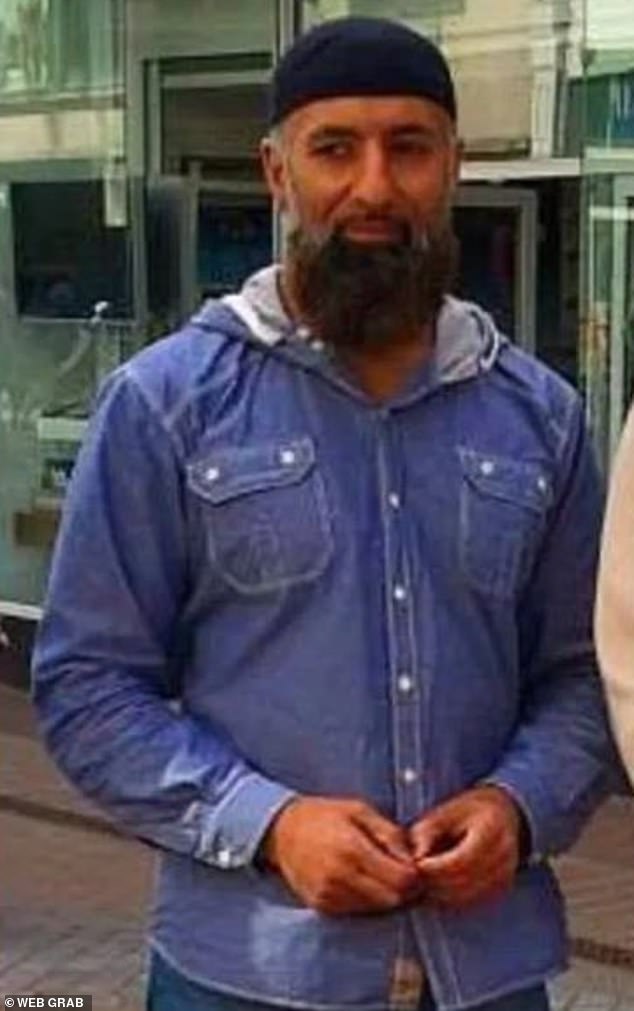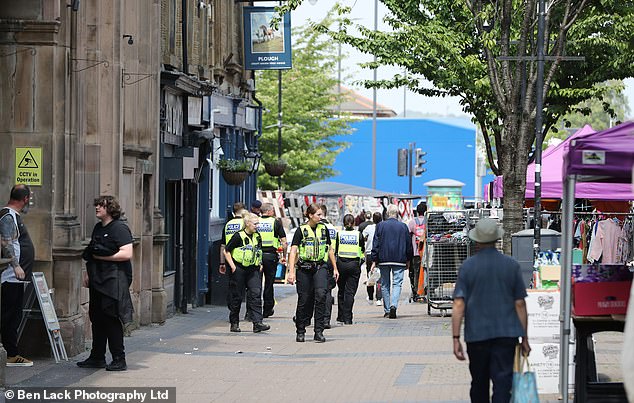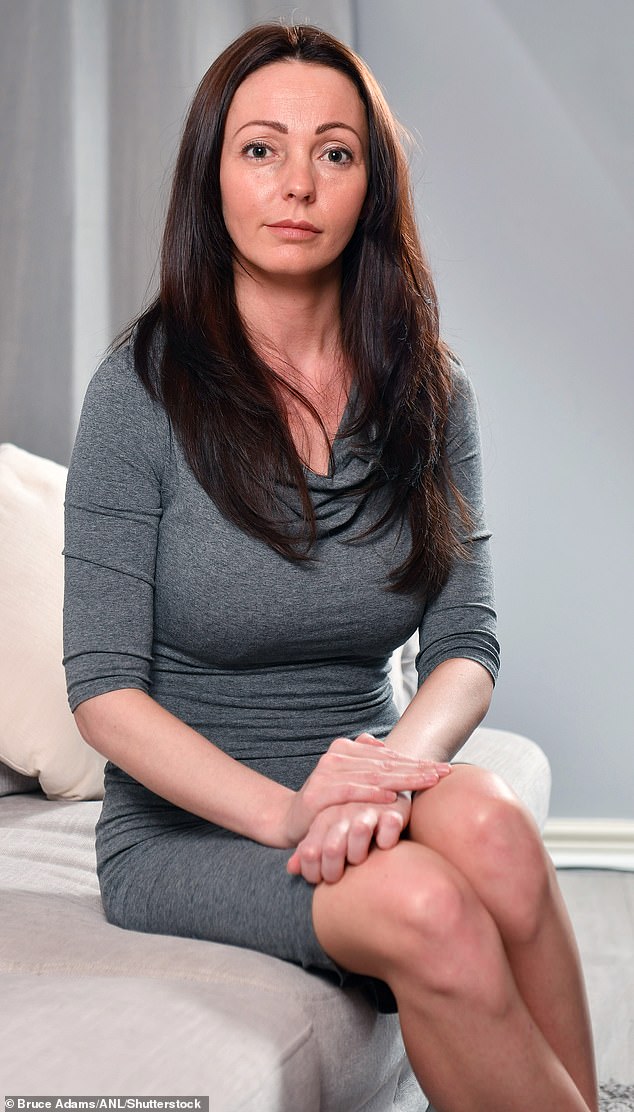With its dirty net curtains, black plastic door and stench of stale air, Elizabeth Harper will never forget the flat in which she was held in Rotherham for ten long weeks in 2004.
Nor will she forget the steady stream of male strangers who were allowed into the fetid bedroom to systematically rape and abuse her.
Nor will she forget the fact that these men knew she was just 14, a vulnerable teenage girl made even more defenceless by the potent alcoholic drinks and drugs with which she was being plied against her will.
Worse than that, they liked it.
But what didn’t cross her mind at the time – and what she didn’t realise until this year, two long decades after her horrific ordeal – was the true identity of one of these men.
‘I just knew him as ‘PC’,’ she says in an exclusive interview with the Daily Mail this week.
‘He always came across a little bit different to the other perpetrators. He was a flash-looking guy. He would come and go on his own, never with the other men. He was giving money to the main facilitator to buy me.
‘It was degrading. He literally bought me for four cigarettes and [a top-up of] my electric [meter] – and then he did whatever he wanted to me.’

Elizabeth – a pseudonym she has adopted to protect herself and her family – was victimised by hundreds of men and once labelled ‘the most abused girl in Rotherham’

PC Hassan Ali was being investigated for his involvement in police abuse of grooming gang victims. He died in 2015 one week after being placed on restricted duties in relation to five complaints against him

The grooming scandal has rocked the town of Rotherham and South Yorkshire Police’s reputation has been damaged
Elizabeth’s haunting story formed part of the nationwide investigation into the Rotherham child sexual exploitation scandal, in which an estimated 1,400 children were abused by grooming gangs in the South Yorkshire town between 1997 and 2013.
Elizabeth – a pseudonym she has adopted to protect herself and her family – was victimised by hundreds of men and once labelled ‘the most abused girl in Rotherham’.
Shafina Ali, the white woman who converted to Islam and lured Elizabeth to her sordid flat after meeting her at a bus stop in 2003 before pimping her out to male Pakistani friends, died in 2009 without being investigated.
But it was only in January this year, however, because of what she describes as ‘distorted memories’ because of post-traumatic stress disorder, that it occurred to Elizabeth what ‘PC’ might stand for.
The parole hearing of Asghar Bostan – who raped her when she was 15 and he 47, and was jailed for nine years in 2018 – had just been adjourned. ‘Going back over everything again, with all those memories coming up, something clicked,’ says Elizabeth, who is now 37 and still lives in her home town.
‘It suddenly occurred to me that PC must have been a police officer.’
She contacted South Yorkshire Police and attended an official interview in March, during which she gave detailed descriptions of ‘PC’ and what she claims he did to her.
A week later, a former police constable in his 50s – previously a member of the same police force to which Elizabeth had appealed for help – was arrested.

Sammy Woodhouse, victim of the grooming scandal turned campaigner who exposed the Rotherham cases, says she named Ali back in 2013
Within weeks, however, he had been bailed – and subsequently released without charge.
A spokesperson for South Yorkshire Police told the Daily Mail this week that Elizabeth’s claims ‘form part of the current ongoing investigation which is being carried out by SYP [South Yorkshire Police] under the direction of IOPC [the police watchdog, the Independent Office for Police Conduct].
‘Details of the arrest were proactively released by the IOPC earlier this year. This individual was not a serving officer at the time of arrest.’
Elizabeth has never spoken publicly about this particular perpetrator before. Nor does she intend to name him (although she now knows his identity).
But this week, amid shocking reports that police officers were involved not only in covering up the Rotherham scandal but also in actively participating in child abuse and sexual assault, she feels empowered to tell her story.
For she now knows she was not the only one.
Although the involvement of police officers formed part of the landmark report by Professor Alexis Jay in 2014, and has been the subject of several news reports since, this has – for some reason – been an overlooked aspect of the Rotherham rhetoric.
Instead, attention has focused on the culpability of the British-Pakistani men whose grooming gangs preyed on innocent children and scoured the streets for victims.
But, according to a chilling report published earlier this week, this is far from the whole story.
The report, based on the testimonies of six women, accuses officers from South Yorkshire Police of raping girls, one as young as 11, as well as supplying illegal Class A drugs to grooming gangs, and physically assaulting children between 1995 and 2004.
In one shocking testimony, a witness, known as ‘Emma’, claims she was raped by a police officer in a squat after running away from a children’s home.
Another witness claims that, as a child, she overheard a police officer having sex with a girl in exchange for drugs and money.
Though they no longer work for the force, all are alleged to have been serving policemen at the time.
Such is the gravity – and indeed depravity – of these statements, which have been collected by Switalskis Solicitors, a specialist legal firm dealing with child abuse, that three former police officers have been arrested in relation to these crimes since October.
While two have been released, one remains on bail. None has been charged.
Nor have any been named – with the exception of PC Hassan Ali, 44, who died in 2015 before he could be brought to justice.
One of Ali’s victims, who goes by the name ‘Willow’, claims she was sexually assaulted by two police officers in the early 2000s, one of whom used to track her and her friends down in his patrol car.
‘He knew where we used to hang out, he would request either oral sex or rape us in the back of the police car,’ she says in her statement.
Ali, she claims, was fully aware of what was happening – and, sickeningly, wanted to join in.
‘The first time, he literally said: ‘You do it for the other officer. So you’re gonna do it for me,” she says.
Letting herself be abused by him, she adds, was somehow better than going back to the grooming gang which had had her in their clutches since she was just 11.
‘I would rather be raped once, or give one man oral sex, than to be taken somewhere where I know it’d be 15… 20 guys one after another.’
And she was not Ali’s only alleged victim.
Sammy Woodhouse, the victim of the grooming scandal turned campaigner who exposed the Rotherham cases and has since become an advocate for victims of child sexual abuse, says she named him back in 2013.
She claims he was involved in a ‘no prosecution deal’ with her rapist, Arshid Hussain – who was jailed for 35 years in 2016.
According to Sammy, now 40, Hussain met Ali at a petrol station in March 2000 and handed her over (after she had been reported missing by her parents) in return for protection from the police investigation.
In her powerful autobiography, Just A Child, in which she gives Ali a different name, she recounts another occasion when he came to her parents’ home and asked her out on a date.
‘Additionally, he accessed information from the police computer system and leaked it,’ she claimed this week.
Despite Sammy and Willow’s claims against him, Ali was never arrested.
He died in February 2015 after being hit by a car, in an unrelated incident, though some have queried the curious timing.
A few days earlier, he had been informed he was being placed on restricted duties in relation to five separate complaints against him. He had, apparently, denied any involvement.
Ali’s name wasn’t reported until December that year, when it emerged during the 2015-2017 criminal trials focusing on the ringleaders of the grooming gangs.
The central witness in the trial, known as Girl B, also named another police officer, Kenneth Dawes, whom she claimed ‘used to have sex with girls’ – namely, underage teenagers.
She claimed she told Dawes about assaults she was allegedly suffering when she was in and out of care homes in the early 1990s, but he did nothing – and then became involved.
‘He used to come to the houses where we were,’ she told the court.
‘He used to take drugs from people and pass them on to Ash [Arshid Hussain].’
DC Dawes, who denied any wrongdoing, was also investigated for searching the names of defendants in the trial on the police database ‘without apparent legitimate policing purposes’.
He was moved to another city, demoted and suspended from duties at the time of the trial – but his name has not resurfaced and it is not known what became of him. He was never charged.
In a statement to the Daily Mail this week, the police watchdog said it could not confirm whether any living officers, former or current, have been or are under investigation ‘unless or until they are charged with an offence or are facing a gross misconduct hearing’.
An IOPC spokesperson added: ‘We did investigate a report made by a third party that a former officer had a sexual relationship with ‘two young vulnerable females’. These individuals were spoken to as adults and denied this took place.’
The watchdog would not confirm whether the officer in question was DC Dawes.
So what hope of justice for the victims who are so bravely speaking out about the role supposed authority figures, meant to protect them from harm, are alleged to have played in their abuse?
Hassan Ali is dead; so, too, of course is Shafina Ali, the woman who facilitated Elizabeth’s abuse and could have led authorities to ‘PC’. As for the police officers whose actions are being outlined by their victims some two decades on, there is yet another twist to this terrible tale.
For the current criminal investigation into their involvement is being led by a major crime unit – within South Yorkshire Police itself.
Professor Jay said this week she was ‘shocked’ to hear it was investigating its own former officers and that criminal enquiries should be handed to another force or independent body.
South Yorkshire Police led the very first investigation into the Rotherham scandal, Operation Central, in 2010, followed by Operation Clover, which led to the criminal trials in 2015.
Since the Jay Report in 2014, however, there have been several independent investigations into how South Yorkshire Police handled reports of abuse dating back to the late 1990s. The first, by the then-IPCC (Independent Police Complaints Commission), found no cases of officer misconduct, instead making recommendations to the force about recording information.
The second, Operation Linden, which ran for five years and concluded in 2022, was more damning.
It found that South Yorkshire Police had ‘fundamentally failed in its duty to protect vulnerable children and young people’ – and that it ignored reports of sexual abuse of children for fear of increasing racial tensions.
Ninety-one investigations were carried out, with the watchdog (which became the IOPC in 2018) upholding 43 complaints against individual officers.
Eight faced misconduct charges; six faced gross misconduct charges. But no officers lost their jobs or faced criminal charges. Operation Stovewood, the single largest inquiry into the scandal, spearheaded by the National Crime Agency, has been ongoing since 2014.
The latest investigation, which is being overseen by the IOPC, is being run by ‘a dedicated team of detectives’, a South Yorkshire Police spokesperson said, adding that they were ‘satisfied that there is no conflict of interest’, and that ‘none of the investigating officers had either worked with any of the former officers under investigation, or were themselves investigated as part of Operation Linden’.
The IOPC said it had chosen the force to run the investigation because of its ‘specialist expertise and resources’, adding that it was ‘regularly under review’.
In a statement it said: ‘We want victim-survivors to feel confident that all complaints will be treated extremely seriously and sensitively. We encourage any victim-survivors or any witnesses to come forward if they have not already done so.’
But this is easier said than done.
Of the 30 women who have given their harrowing personal accounts to Switalskis Solicitors, only 17 have agreed to their testimony being given to the police.
The others have withdrawn from the investigation, saying they do not trust the force – or have lost faith in the justice system entirely.
This is how Elizabeth feels.
When she was eventually rescued from the flat in which she was repeatedly raped, weighing just 5st, filthy and infested with lice, it was not by police – but by the youth charity, Risky Business.
‘The police drastically failed in their duty to protect me,’ she says.
‘The fact that South Yorkshire Police are now apparently investigating what went on is disgusting.
‘They should not be overseeing something they’ve already failed their victims on.
‘Are they trying to suggest those police officers under investigation won’t still have some friends in the force?’
She and other survivors of this heinous stain on Rotherham’s history are, she claims, ‘collateral damage in a system riddled with corruption and cover-ups. We are victims of one of Britain’s darkest secrets.
‘I have got deep psychological trauma because of what happened to me. I’ve got complex PTSD, anxiety, depression.
‘And that’s not just down to the perpetrators and the grooming gangs; that’s secondary trauma because I was sidelined and ignored when I tried to speak out.
‘Now I know why. When I needed them the most, nobody tried to save me.
‘It’s because they were there too; they were part of it all along.’












